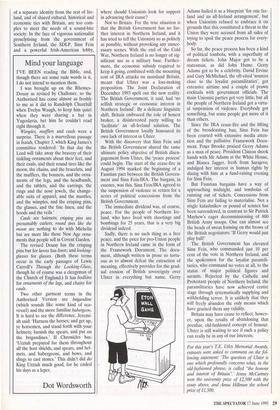Mind your language
I'VE BEEN reading the Bible, and, though there are some rude words in it, I do not intend to mention them.
I was brought up on the Rhemes- Douay as revised by Challoner, so the Authorised has come almost as freshly to me as it did to Randolph Churchill when Evelyn Waugh, to keep him quiet when they were sharing a but in Yugoslavia, bet him he couldn't read right through it.
Wimples, mufflers and cauls were a surprise. There is a marvellous passage in Isaiah, Chapter 3, which King James's committee rendered: 'In that day the Lord will take away the bravery of their tinkling ornaments about their feet, and their cauls, and their round tires like the moon, the chains, and the bracelets, and the mufflers, the bonnets, and the orna- ments of the legs, and the headbands, and the tablets, and the earrings, the rings and the nose jewels, the change- able suits of apparel, and the mantles, and the wimples, and the crisping pins, the glasses, and the fine linen, and the hoods and the veils.'
Cauls are hairnets; crisping pins are presumably curlers; round tires like the moon are nothing to do with Michelin but are more like those New Age orna- ments that people sell in Covent Garden.
The revised Douay has the crisping pins but for lawns has linen; and looking- glasses for glasses. (Both these terms occur in the early passages of Lewis Carroll's Through the Looking-Glass, though he of course was a clergyman. of the Church of England.) It has bodkins for ornaments of the legs, and chains for cauls.
Two other garment terms in the Authorised Version are brigandine (which sounds like some kind of sea- vessel) and the more familiar habergeon. It is hard to see the difference. Jeremi- ah said: 'Harness the horses; and get up, ye horsemen, and stand forth with your helmets; furnish the spears, and put on the brigandines.' II Chronicles has: `Uzziah prepared for them throughout all the host shields, and spears, and hel- mets, and habergeons, and bows, and slings to cast stones.' This didn't did do King Uzziah much good, for he ended his days as a leper.
Dot Wordsworth


































































 Previous page
Previous page